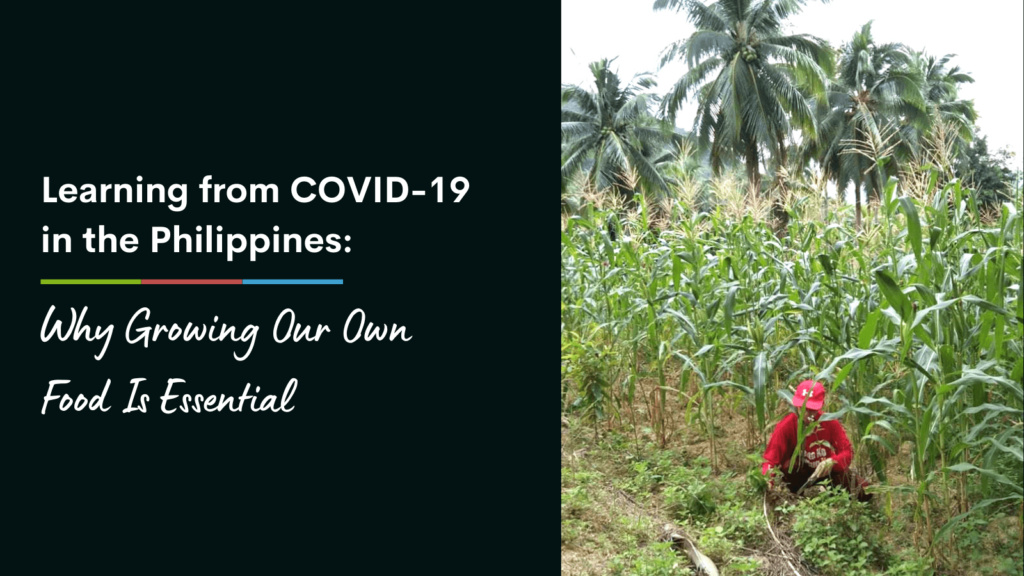Learning from COVID-19 in the Philippines: Why Growing Our Own Food Is Essential
By: Rene Lucero, Guest Writer

Cebu is an island province in the central part of the Philippines that hosts the country’s second-biggest city, Cebu City. Agriculture is one of the main economic activities on the island, along with fisheries, industry, and tourism. Being a major tourist destination, Cebu suffered so much from the COVID-19 pandemic. The first COVID-19 case in the country was an international traveler who entered Cebu.
The first lockdown that was enforced in March 2020 shocked everyone. All of a sudden, people lost their jobs and sources of livelihood. Those who were working in the city, the epicenter of the pandemic, had to return to their provincial homes together with their families.
Barangay Tabayag is an upland barangay in the municipality of Argao located in southeastern Cebu. By road network, the village is located 77 kilometers from Cebu City. Farming is the main source of income for the community. The lockdown required that “all work will have to stop and everyone will be required to stay inside their house 24 hours a day except for essential services.” Quarantine passes were issued to one designated person per household to do what is essential, e.g., buy food and other necessities.
Sudden loss of income
The women farmers of Barangay Tabayag shared stories of their experiences during the lockdown. The sudden loss of mobility due to the lockdown affected the lives of farming families in many ways. They could no longer take their farm produce to the town market and immediately lost their source of income. For the same reason, they could not buy their regular household needs from the market to take home. When quarantine passes were issued, the men managed to go to the town market found out that the market entry was regulated by the government. They felt that it was unlikely that they could sell their products inside.
Surviving the lockdown with home-grown food
Many farming families in Tabayag have children who have moved to the city or other places to work. Now jobless, they returned to their parents’ home together with their families. With increased household size, there was more pressure to secure food. “We were lucky, we just harvested our yellow corn (not normally eaten by people but given to animals). My son and his family, including the young children, were forced to eat yellow corn and sweet potato from the farm,” said Terry a mother of four and grandmother of five. Lisa said, “my children who came home from the city did not bring any groceries. We had ampalaya (bitter gourd) from the farm. That was all they ate.”
Innovating local markets
Virgie and Elsa had sons who worked as international seafarers but returned home jobless due to the pandemic. Independently, the two came up with the same idea of securing travel passes, buying vegetables locally, and selling them in the neighboring villages using their multi-cab (small multiple-use vehicle). Later, they engaged in online marketing using Facebook and delivered vegetables door-to-door. This helped the local farmers market their farm produce, thereby enabling the farmers’ livelihood to thrive despite the pandemic. Subsequently, they also procured goods from the town that the upland villages needed such as dried fish, sugar, salt, cooking oil, bath soap, and laundry detergent. Their sales were higher when families received cash assistance from the government.
Despite more work that the Tabayag women had to do during the lockdown, such as teaching children and grandchildren in their remote education, cooking more food, and washing more clothes due to more household members, they still managed to do their usual farm work. Terry shared that she had 10 pigs ready for sale when the pork price dropped due to low demand in the public market. She decided to go around the village and ask her neighbors if they want to buy pork. Amazed by the number of orders, she decided to slaughter her pigs locally and sell them locally. Earlier, her husband and her children discouraged her from raising pigs thinking they could not make money from it. With this new marketing strategy, she continues to raise pigs.
What would be more helpful to women farmers
A remote village, Barangay Tabayag did not have an internet connection in the past. Due to the pandemic, schools were closed, and classes were done remotely using the internet. The teachers from the village had to find ways to get an internet connection to keep their jobs. When they succeeded, the farming families made use of internet connectivity for marketing their farm produce.
The women farmers believe they are better off if they know how to use social media – like Facebook – to access information, to maintain communication with family members and relatives in other places, and to engage in online marketing. However, the internet is only available in a few houses in the barangay and most women still do not have smartphones. They also believe the ability to drive a motorcycle would be empowering and would make their life easier.
Lessons and recommendations for local food security and markets
It took the pandemic and the subsequent lockdown to demonstrate to us that growing our own food is essential if we want to survive on a family level. It also teaches us that a global crisis can break down wider economic networks and that a way for communities to survive is by reinforcing and strengthening local markets.
